Brave + true: Guest blog on the lure of Linder + Ludus

//Flyer for Ludus performance at Cabaret Futura, London, 1981//
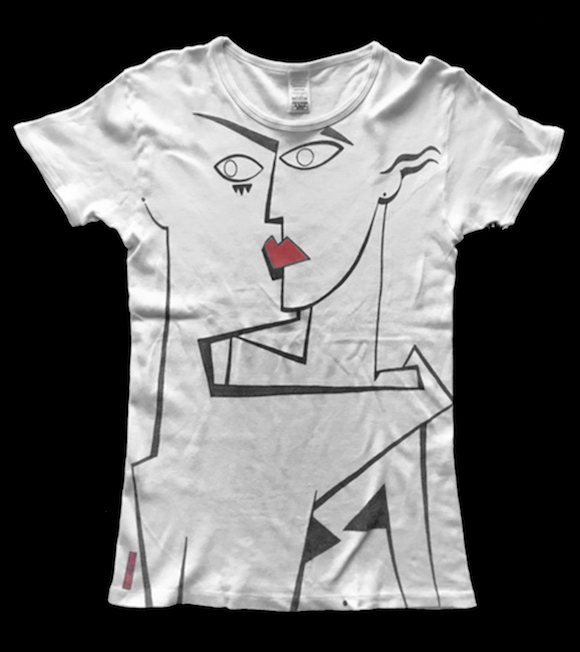
//One of two hand-painted t-shirts given to the author, depicting him and Linder’s sister Nettie in a lover’s embrace in 1983. No reproduction without permission//
On the eve of the opening of Linderism, a new exhibition by the great contemporary artist Linder, I’m publishing a guest post by a follower of this blog who, like many, was introduced to her work via the sleeve artwork for Buzzcocks’ 1977 single Orgasm Addict.
“To me, it was punk for the eyes rather than the ears,” writes the contributor, who has asked for anonymity and was a 17-year-old school-leaver living in south London at the time.
He went on to forge a connection with Linder by following her post-punk group Ludus and encountered many in her circle, including the pre-Smiths Steven Morrissey.
Here he tells his story and shows a selection of the artworks Linder gave him:
The message I received from the Orgasm Addict sleeve was: “Think A.N.Other way. See it as it is”. A few months later I purchased The Secret Public, Linder’s print collaboration with Jon Savage. Again I’d never seen anything like it, hardcore pornographic imagery redirected into a cocktail of consumerist lust.
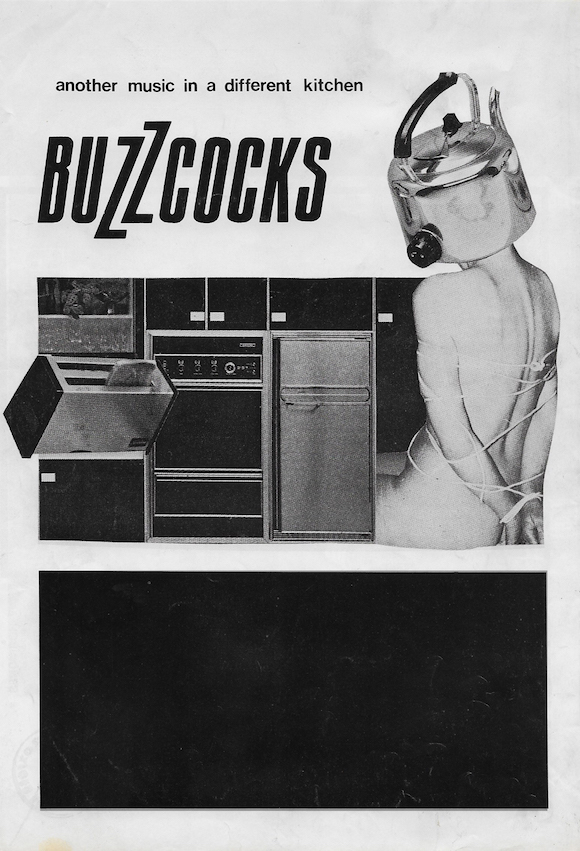
//Back page of The Secret Public, Linder + Jon Savage, 1978//
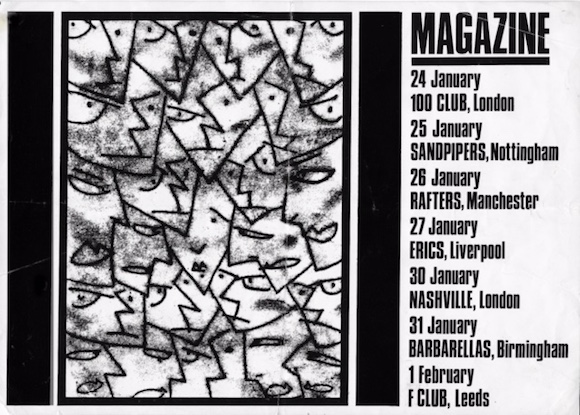
//Artwork for 1978 Magazine tour which appeared on a t-shirt worn by the group’s frontman Howard Devoto//
Over the next few months, I encountered other aspects of her work such as the cover of Magazine’s Real Life and the t-shirt the band’s singer Howard Devoto wore during an Old Grey Whistle Test promo video screening. These pieces, though markedly different from Linder’s photomontage work, still held some kind of connection, which – I felt – was both immediately identifiable and spoke directly to me.
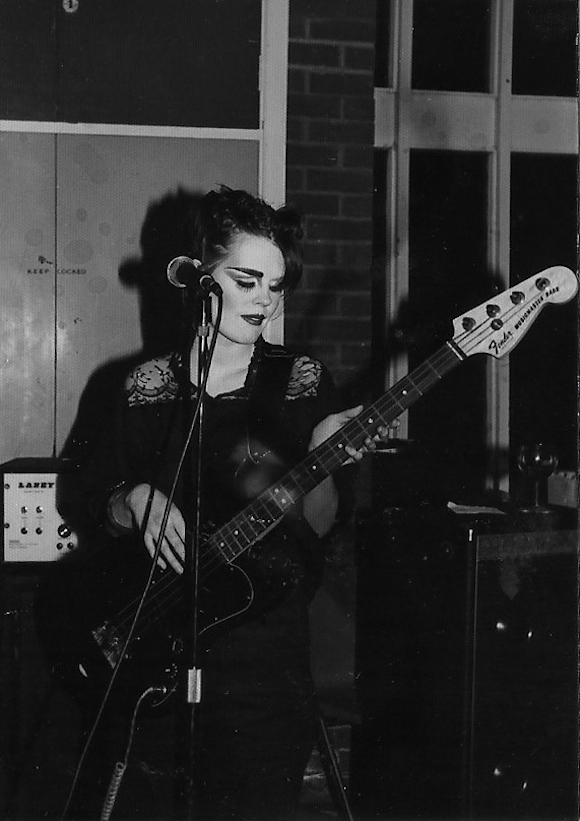
//1981 Ludus performance captured by photographer who sent the author this image a few weeks later. Happy to credit whoever it was//
By 1979 I’d noticed that Linder had a band: Ludus. But almost all their shows seemed local to the North West, and way back then, to a semi-penniless suburban-dwelling London waif, Manchester seemed a long way off. Then, in the spring of 1980, I read a glowing NME review for Ludus’s first vinyl release The Visit. Musically it was unlike anything I’d heard before and the sleeve artwork was as striking and immediate as the music.
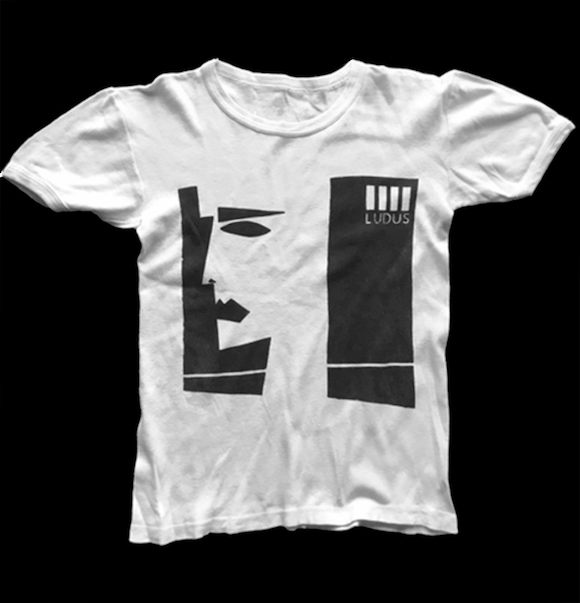
//T-shirt with artwork for Ludus’s first release, The Visit EP, 1980. No reproduction without permission//
I encouraged several friends to buy the EP; one took his newly purchased copy to a gig at Soho’s Marquee, and, desperate to hear what the song I Can’t Swim I Have Nightmares sounded like, persuaded the house DJ to play it between band sets. The six-minute piece lasted less than 90 seconds on the club’s decks before the DJ huffily handed it back to my pal, describing it as “unlistenable shite”. It was wild, it was noise, it was jazz, it was scat AND, best of all, it was NOT MARQUEE MUSIC. The Ludus sound was totally contemporary, unlike anything else. Anti-rock music in a music scene rapidly losing steam.
I finally caught Ludus in September 1980 supporting the Psychedelic Furs at the Lyceum ballroom and a few days later, watched them perform again at the tiny 101 Club in Clapham. Here I introduced myself to the group, telling Linder how The Visit’s sleeve so perfectly illustrated the music’s abrasive, fragile beauty. I still recall how pleased she was to hear my words.
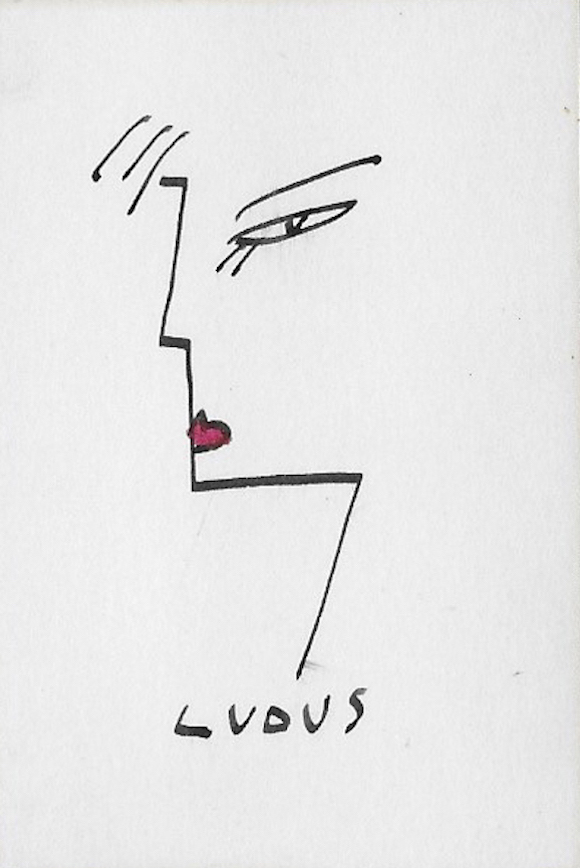
//Card, one of 25 inserted into the sleeve of Ludus’s My Cherry Is In Sherry single, 1980//
That night I bought an advance copy of their next single, My Cherry Is In Sherry/Anatomy Is Not Destiny. Tucked inside the sleeve I found a small extra gift, a hand-drawn sketch on card inserted into the first 25 copies and eagerly asked about their next appearance.
“Rafters Manchester, next Wednesday.”
“I’ll come,” I replied.
“Then we’ll put you up,” said Linder.
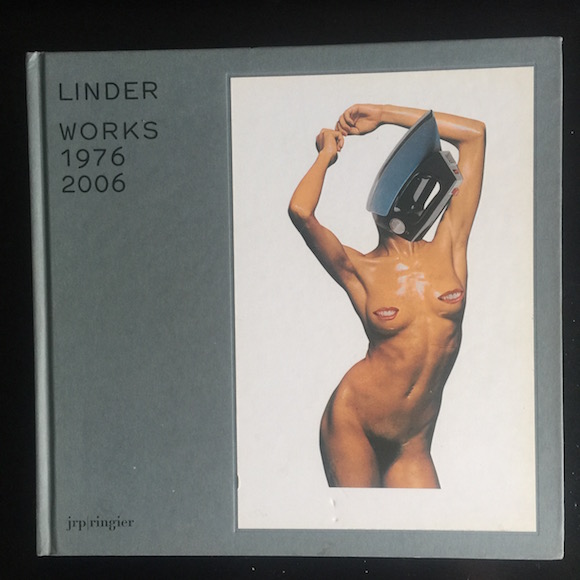
//The Orgasm Addict image on the front of Linder: Works 1976-2006, JRP|Ringier, 2006//
With two friends I traveled by coach to the red-brick drabness of post-industrial Manchester. After the gig, we slept on the kitchen floor of Linder’s tiny attic flat at 35 Mayfield Road, Whalley Range. On our departure she presented each of us with a signed Orgasm Addict poster. She had a few stored in a corner, gathering dust. Back then she couldn’t give ‘em away.
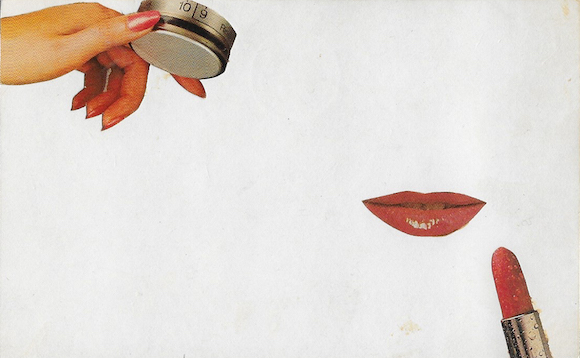
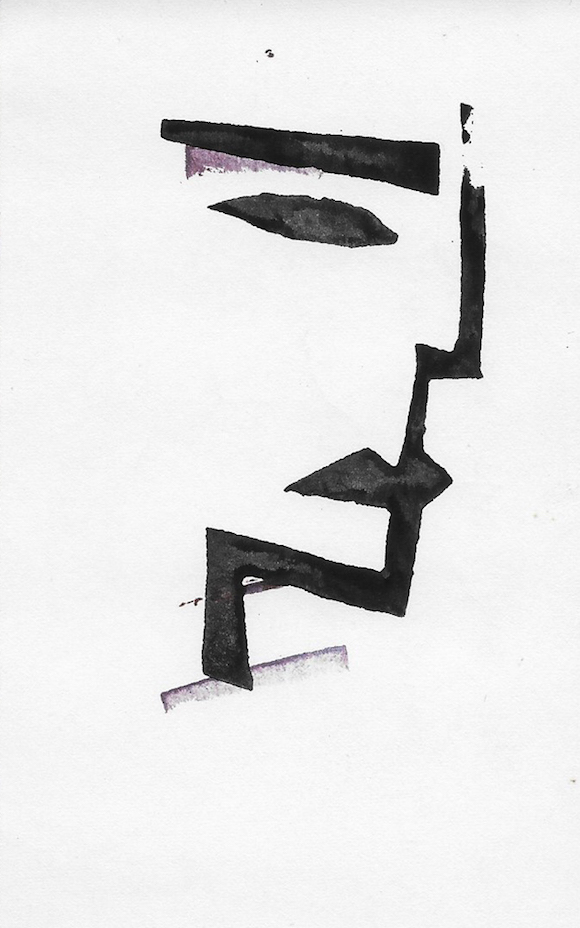
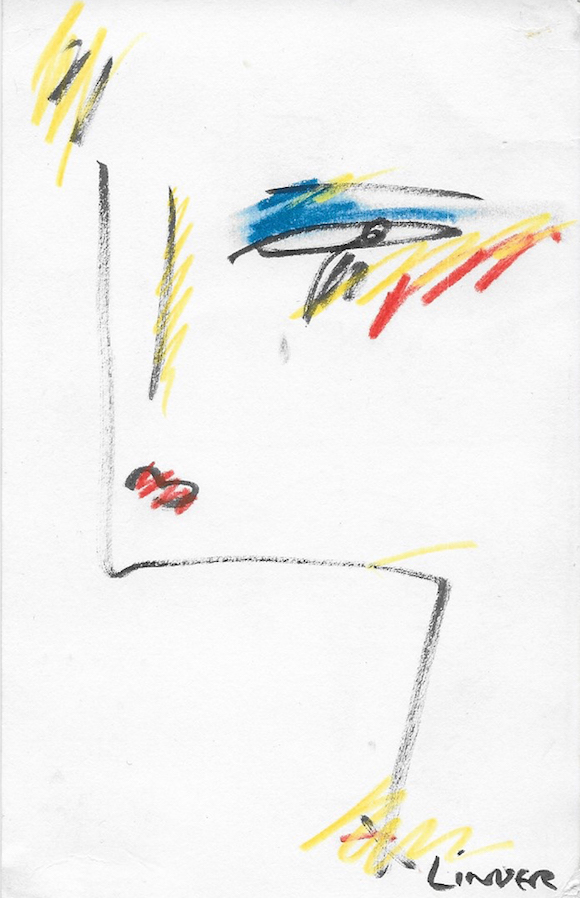
//Above: Three postcards sent to the author by Linder 1980-81//
Two weeks later I was back up in Manchester for another show at Rafters again, and was introduced to Linder’s friend Steven.
A caustic, sulky chap (to me at least) he had until my arrival claimed Ludus for his own, and wasn’t happy about sharing or being upstaged by, of all things, a “Cockney smartarse”. But we learned to get along, and with Linder, her sister Nettie and Ian from Ludus, we’d often go nightclubbing, though, of course, Steven didn’t dance .
So began a period when I spent most weekends travelling between London and Manchester. I also accompanied the band as they played around the country, as well as sitting in on events such as the shoot with photographer Christina Birrer for the SheShe booklet and the recording of the Mother’s Hour/Patient single at Rochdale’s Cargo Studio, where, as Linder added primal screams to backing tracks of multiple guitars and frantic percussion, Stephen writhed around the control room not unlike Charles Hawtrey with a worm infection. “It must be good if Stephen’s dancing,” Linder and Ian giggled.
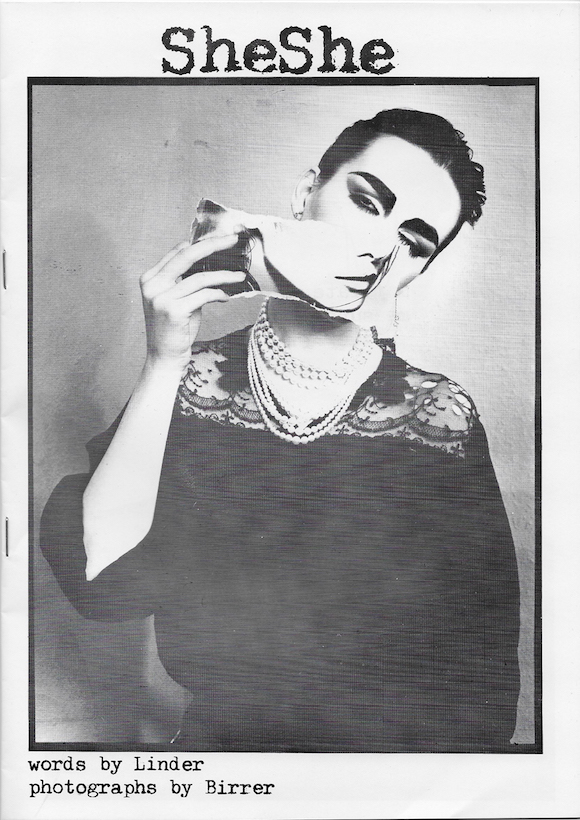
//Front cover of the SheShe booklet produced by Sterling and Christina Birrer to accompany the release of the Ludus cassette Pickpocket, 1981//
For me Ludus’s pièce de résistance was the night they headlined Richard Strange’s short-lived neo-futurist nightspot Cabaret Futura, beginning their set playing to a packed hall of glamorous Blitz people. Forty minutes later, there were less a dozen left.

//Video still of Ludus performance at the Hacienda, November 5, 1982. From Linder: Works 1976 – 2006//
Around the time the Haçienda opened its doors Linder presented me with one of only two hand-painted t-shirts depicting Nettie and I locked in a lovers embrace. For the band’s gig at the Haçienda every table in the club was decked with a candle, a rose and a red paint-soaked tampon and “our Linder” took to the stage looking like a Bladerunner extra, wearing a rah-rah skirt made of raw meat which she discarded halfway through the show to reveal the huge black shiny rubber strap-on.
A few weeks later I visited 35 Mayfield Road for the last time and was greeted with the news: “Steven’s joined a band; it’s their first rehearsal this weekend – they’re calling themselves The Smiths.” I thought that they would never get anywhere with a name like that and might as well have call themselves The Ogdens.
After that visit I didn’t speak to or see Linder again for 26 years. There was no falling out. We just went our separate ways, and when we did touch base for a live radio broadcast from the Frieze art fair it was like we’d never been apart. Our worlds may be different, but we are still connected. “It was great radio,” I was told afterwards. “The studio took loads of calls saying the music was fantastic and asking who the band was.”
“They’re the fuckers who used to play to half a dozen people and emptied the Cabaret Futura,” I almost replied. Instead I just smiled. Linder deserves her success and Ludus deserve greater recognition because Linder’s work is just like her music, both brave and true.
_____________
In this 2008 interview for the Tate, Linder talks about the photomontages she produced while studying at Manchester Polytechnic, some of which were used for Buzzcocks and The Secret Public.
Linderism runs at Cambridge’s Kettle’s Yard from February 15 to April 26. Details here.
Visit here for a complete Ludus discography.
